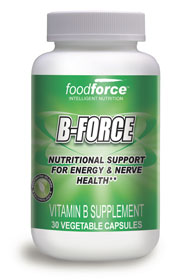| FoodForce Vitamin B-12 Vitamin B12 ensures the smooth functioning of vital life processes of the human body. It is important for maintaining a healthy nervous system and DNA production. Vitamin B12 helps to regulate the formation of red blood cells in the body. Other benefits of vitamin B12 include its role in maintaining and increasing energy levels in the human body. Although the human body does store vitamin B12, it is the most common nutritional deficiency in the developing world and possibly in the U.S. (reports the August 2005 issue of the Harvard Health Letter) Essential to protect the body against anemia and support a healthy central nervous system*, vitamin B12 is a water-soluble vitamin involved in the metabolism of every cell of the body.† Helping to support the body’s own production of energy through its role in the metabolism of food, vitamin B12 helps maintain healthy nerve cells and red blood cells and is also needed to make DNA, the genetic material in all cells.†
Vitamin B-12 and folic acid are intimately involved as vitamin cofactors in the cellular production of nucleic acids, protein and certain amino acids. Physiological anabolic functions of Vitamin B-12 and folic acid include DNA synthesis, RNA synthesis, nucleic acid metabolism, protein synthesis, cell division and amino acid synthesis (methionine, serine, glycine). The absorption of Vitamin B-12 is governed by the intrinsic factor, secreted from parietal cells of the stomach wall as a normal part of gastric juice. A failure in any stage in the absorption of the vitamin can render it unavailable. For instance, one third of people over 60 who no longer secrete gastric acid are unable to absorb Vitamin B-12 from food because they are unable to split B-12 from the protein complex to which it is attached. If the gastric juice of a person lacks the intrinsic factor necessary for absorption of Vitamin B-12, there is no uptake of the vitamin at all from the amounts normally provided in food. However, if amounts about 1000 times the normal dosage are given, sufficient amounts to meet the needs of an individual may pass through the wall by diffusion. The efficiency of absorption appears to diminish with increase in age, with a pyridoxine deficiency resulting from a decreased synthesis of intrinsic factor, with an iron inadequacy and in hypothyroidism. †These statements have not been evaluated by the Food and Drug Administration. |




